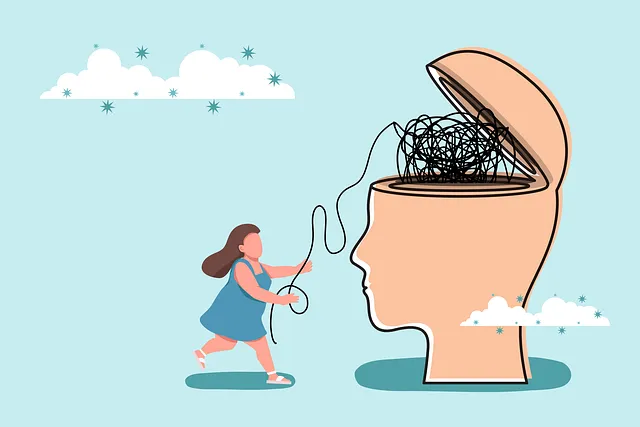Mental wellness apps are revolutionizing healthcare by offering personalized, accessible solutions, especially for those who cannot attend traditional centers like the Boulder Kaiser Permanente mental health appointment center. These apps include features like meditation guides, mood tracking, and virtual therapists, with a focus on cultural sensitivity for inclusivity. User engagement is key, achieved through interactive elements such as guided meditations, CBT tools, and personalized progress tracking. Integrating evidence-based therapies, emotional intelligence exercises, and robust security practices ensures effectiveness and accessibility for diverse users, addressing mental health concerns in today's digital era.
Mental wellness apps are gaining traction as essential tools for managing stress, anxiety, and depression. With increasing demand from users seeking digital solutions, the market is ripe for innovative app development. This article explores the key aspects of creating effective mental wellness apps, from understanding user needs to integrating evidence-based therapies. We’ll delve into design strategies that foster engagement, privacy and security measures, and accessibility considerations inspired by leaders like Boulder Kaiser Permanente Mental Health Appointment Center, ensuring apps meet users where they are.
- Understanding the Need for Mental Wellness Apps
- Designing Effective Features for User Engagement
- Integrating Evidence-Based Therapies and Tools
- Privacy, Security, and Accessibility Considerations for App Development
Understanding the Need for Mental Wellness Apps

In today’s fast-paced world, mental wellness is a cornerstone of overall health and well-being. The demand for accessible and personalized mental healthcare solutions has never been higher. Apps designed to support mental health offer a convenient and discreet way for individuals to manage their emotional well-being. For instance, features like meditation guides, mood tracking, and access to virtual therapists can significantly benefit users, especially those who might find it challenging to attend traditional Kaiser Permanente mental health appointment center in Boulder.
Cultural sensitivity in mental healthcare practice is a crucial aspect that these apps should address. Incorporating techniques that promote emotional well-being across diverse cultural backgrounds ensures inclusivity and effectiveness. Additionally, the production of mental wellness podcast series within these apps can provide engaging content, offering valuable insights and stories to inspire users on their journey towards better mental health.
Designing Effective Features for User Engagement

In designing features for a mental wellness app, user engagement is paramount. Incorporating interactive elements that mimic successful programs like Boulder Kaiser Permanente mental health appointment center can significantly enhance user participation. Stress Management Workshops Organization and Mental Health Education Programs Design are effective strategies to include. These could manifest as guided meditations, cognitive behavioral therapy (CBT) tools, or personalized mood tracking with insightful analytics. By offering a mix of educational content and practical exercises, the app caters to diverse user needs and preferences, fostering long-term engagement.
Confidence Boosting features tailored to individual progress also play a crucial role in keeping users invested. Incorporating challenges, rewards systems, and milestones that track growth can instill a sense of accomplishment and motivation. These elements should be designed with accessibility in mind, ensuring they are inclusive and cater to various mental health journeys and levels of comfort with technology.
Integrating Evidence-Based Therapies and Tools

In developing a mental wellness app, integrating evidence-based therapies and tools is paramount. Organizations like Boulder Kaiser Permanente Mental Health Appointment Center exemplify best practices by incorporating strategies such as cognitive behavioral therapy (CBT), mindfulness techniques, and self-awareness exercises to enhance user well-being. These therapeutic approaches are supported by extensive research, ensuring their effectiveness in addressing various mental health concerns.
Furthermore, incorporating features that promote emotional intelligence and cultural competency among healthcare providers can significantly improve app users’ experiences. By training developers and therapists on diverse cultural perspectives, the app becomes more inclusive and accessible to a wide range of users. This approach not only respects individual differences but also ensures that the provided tools resonate with users from various backgrounds, fostering deeper engagement and better outcomes.
Privacy, Security, and Accessibility Considerations for App Development

Privacy, security, and accessibility are paramount when developing mental wellness apps, especially considering sensitive user data handled by platforms like Boulder Kaiser Permanente mental health appointment centers. Users trust these applications to safeguard their personal information and maintain confidentiality during therapy sessions or emotional well-being promotion techniques discussions. Developers must implement robust encryption protocols and secure data storage methods to protect against unauthorized access or breaches.
Moreover, ensuring accessibility is crucial for reaching a broader audience and promoting mental illness stigma reduction efforts. App developers should consider diverse user needs, including those with disabilities, by adhering to inclusive design principles. This might involve incorporating features that support public awareness campaigns development, such as adjustable font sizes, screen readers, or alternative input methods, making the app accessible to all individuals seeking support for their mental health journeys.
Mental wellness apps have emerged as powerful tools in addressing the growing demand for accessible and personalized mental healthcare solutions. By combining user-centric design with evidence-based therapies, these applications offer a promising avenue to support individual well-being. As demonstrated by organizations like Boulder Kaiser Permanente Mental Health Appointment Center, integrating secure and private features is essential for gaining user trust. When developed with a focus on engagement, evidence-backed practices, and accessibility, mental wellness apps have the potential to revolutionize self-care routines, making professional support more attainable and convenient for all.






